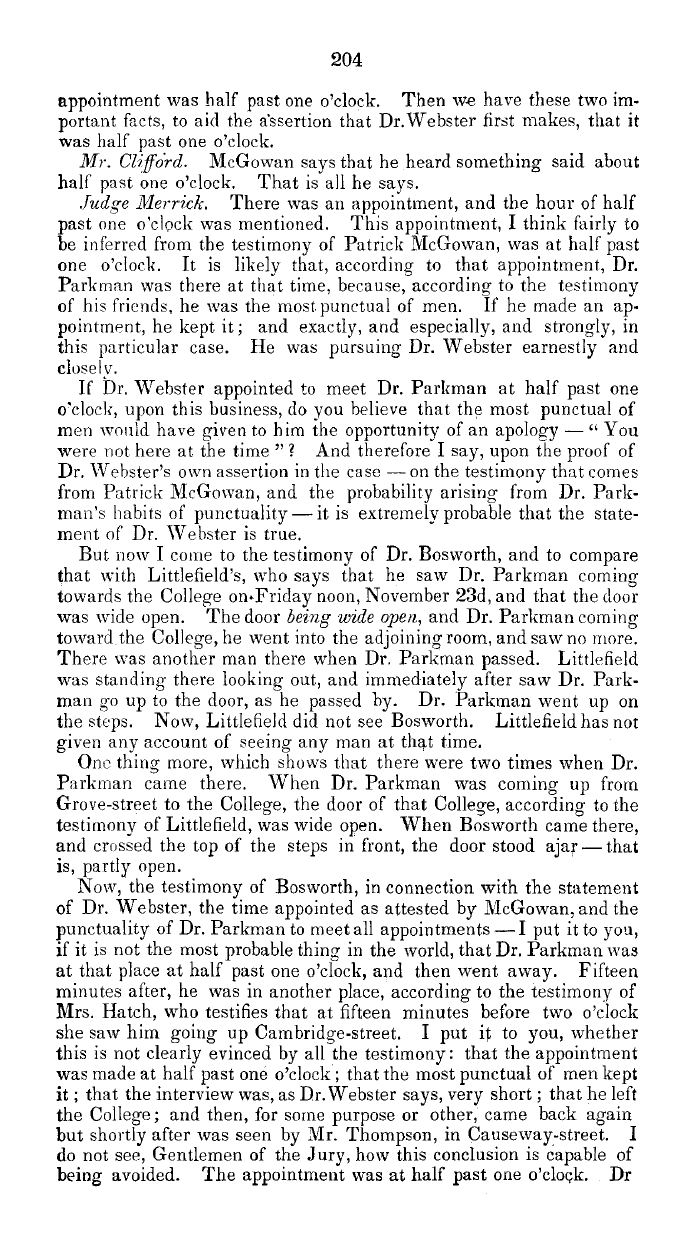|
204
appointment was half past one o'clock. Then we have these two im.
portant facts, to aid the assertion that DrWebster first makes, that it
was half past one o'clock.
.'Vlr. Cliford. McGowan says that he heard something said about
half past one o'clock. That is all he says.
.fudge Merrick. There was an appointment, and the hour of half
past one o'clock was mentioned. This appointment, I think fairly to
be inferred from the testimony of Patrick McGowan, was at half past
one o'clock. It is likely that, according to that appointment, Dr.
Parkman was there at that time, because, according to the testimony
of his friends, he was the mostpunctual of men. If he made an ap-
pointment, he kept it; and exactly, and especially, and strongly, in
this particular case. He was pursuing Dr. Webster earnestly and
closelv.
If Dr. Webster appointed to meet Dr. Parkman at half past one
o'clock, upon this business, do you believe that the most. punctual of
men would have given to him the opportunity of an apology - °° You
were not here at the time "? And therefore I say, upon the proof of
Dr. Webster's own assertion in the case - on the testimony that comes
from Patrick McGowan, and the probability arising from Dr. Park-
man's habits of punctuality-it is extremely probable that the state-
ment of Dr. Webster is true.
But now I come to the testimony of Dr. Bosworth, and to compare
that with Littlefield's, who says that he saw Dr. Parkman coming
towards the College on-Friday noon, November 23d, and that the door
was wide open. The door being wide open, and Dr. Parkman coming
toward the College, he went into the adjoining room, and saw no more.
There was another man there when Dr. Parkman passed. Littlefield
was standing there looking out, and immediately after saw Dr. Park-
man go up to the door, as he passed by. Dr. Parkman went up on
the steps. Now, Littlefield did not see Bosworth. Littlefield hasnot
given any account of seeing any man at that time.
Ono thing more, which shows that there were two times when Dr.
Parkman carne there. When Dr. Parkman was coming up from
Grove-street to the College, the door of that College, according to the
testimony of Littlefield, was wide open. When Bosworth came there,
and crossed the top of the steps in front, the door stood ajar-that
is, partly open.
Now, the testimony of Bosworth, in connection with the statement
of Dr. Webster, the time appointed as attested by McGowan, and the
punctuality of Dr. Parkman to meet all appointments-I put it to you,
if it is not the most probable thing in the world, that Dr. Parkman was
at that place at half past one o'clock, and then went away. Fifteen
minutes after, he was in another place, according to the testimony of
Mrs. Hatch, who testifies that at fifteen minutes before two o'clock
she saw him going up Cambridge-street. I put it to you, whether
this is not clearly evinced by all the testimony: that the appointment
was made at half past one o'clock; that the most punctual of men kept
it ; that the interview was, as Dr. Webster says, very short; that he left
the College; and then, for some purpose or other, came back again
but shortly after was seen by Mr. Thompson, in Causeway-street. I
do not see, Gentlemen of the Jury, how this conclusion is capable of
being avoided. The appointment was at half past one o'cloqk. Dr
|

